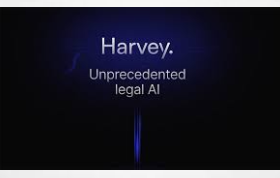It’s an ad essentially but if you need an overview you might as well start here.
Harvey AI is a generative artificial intelligence platform tailored for legal professionals. Unlike other AI platforms trained on general internet data, the startup, founded by Winston Weinberg and Gabriel Pererya, used a large language model containing legal-specific datasets and case law materials to train it.
As a result, Harvey AI allows lawyers and attorneys to leverage AI capabilities and assist them in legal tasks across various jurisdictions and practice areas. Users can also train the platform with their own documents to receive personalized assistance based on the resources they fed it with.
Harvey AI’s Funding and Rise to Fame
Allen & Overy, a London-based firm that’s one of the biggest in the world, tested Harvey AI in November 2022. 3,500 of its lawyers asked the platform over 40,000 questions. The firm was so impressed that it finalized its partnership with the startup in February 2023. Other firms that have publicly announced their strategic alliance with Harvey AI include Gleiss Lutz and Maples and Calder.
On April 2023, the startup received a $21 million Series A funding from prominent venture capital firm Sequoia. Before the end of the year, Harvey AI received another $80 million Series B funding round, some of which came from OpenAI’s startup fund. These funds helped increase the company’s valuation to $715 million.
Top Harvey AI Features
Below are just some of the things Harvey AI can do for your law firm and provide your clients with top-notch legal services at scale and without compromising on quality for greater client satisfaction:
Analysis of Legal Documents
Lawyers can ask Harvey AI to review documents and determine vital elements and potential issues they must address. The platform draws from general legal data or records you trained it with to help spot these elements so you don’t have to, enabling you to focus on taking action on these issues instead.
Litigation Assistance
Harvey AI assists lawyers and attorneys by providing them with pertinent case information drawn from its data on past legal precedents and case files. It helps them assess current case risks based on outcomes from prior cases with similar facts and legal issues. This information enables legal professionals to make informed decisions and increase their chances of winning.
Regulatory Compliance
Compliance requirements and regulatory documents can sometimes become confusing, or you might miss regulations that could cause compliance issues. To avoid this, feed the documents to Harvey AI, which will break down the technical jargon and summarize them in an easy-to-understand way. It can also monitor regulation changes to help your firm avoid penalties and reputational damage.
How Macfarlanes and Other Law Firms Use Harvey AI
Aside from Allen & Overy, other major law firms are leveraging Harvey AI as part of their workflow to improve their legal practices. Macfarlenes LLP, another London-based law firm, also uses the platform to analyze and interpret documents. More importantly, its lawyers ask Harvey AI to summarize presentation notes and sound bites, draft emails using language appropriate to the recipient, and even write contracts for them.
Nixon Peabody used Harvey AI specifically for timekeeping to help improve efficiency and accurately record client billable hours. PwC, a network of firms across 152 countries, is using Harvey AI to train its proprietary AI models and develop custom products and professional services for personal use to sell to clients.
The Future of Generative AI Model in the Legal Industry
Tools like Harvey AI and, to a lesser extent, ChatGPT won’t be the last generative AI platform for the legal profession. If anything, the industry is barely scratching the surface of what AI can do for lawyers and attorneys across different legal systems and jurisdictions, some of which may not be advantageous to law firms.
Aside from automating routine tasks and enhancing legal research, AI can provide people with free access to basic advice and document preparation assistance for their legal needs, cutting firms out of the equation. Constant AI use may also raise ethical and privacy considerations about the confidentiality of sensitive client information, bias in AI-generated advice, and others.
These AI trends in legal marketing may happen sooner than later, so law firms must stay on top of AI developments in the legal space. Knowing and taking advantage of these changes allows your firm to adapt to and overcome them while continuing to benefit from AI’s functionalities.




